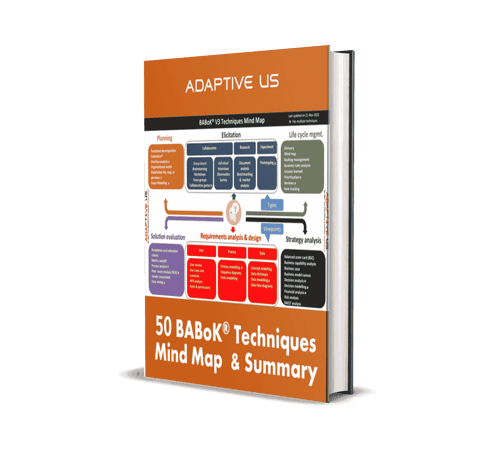Organizational Solutions Expertise: Business Analysis for HR Managers
Are you an HR Manager looking to enhance your skills and stay ahead in today's ever-changing business landscape? Look no further! In this blog post, we will explore the fascinating world of business analysis and how it can revolutionize how you approach your role as an HR manager. Whether you're new to the field or a seasoned veteran, understanding the principles of business analysis is crucial for driving effective decision-making, optimizing workforce strategies, and ultimately achieving organizational success. So fasten your seatbelts and prepare for an insightful journey into Business Analysis for HR Managers!
Who is a Human Resource Manager?
Who exactly is a Human Resource Manager, you may ask? An HR Manager is a crucial player in any organization's success. They are the individuals responsible for managing the human capital - the employees - who drive the company forward. These professionals wear many hats and have a wide range of responsibilities.
First and foremost, HR Managers are tasked with recruiting and hiring top talent. They scour resumes, conduct interviews, and make decisions that will shape the future of the workforce. Additionally, they play a crucial role in employee onboarding and training to ensure new hires feel welcomed and equipped with the necessary skills.
HR Managers also oversee various aspects related to employee development, such as performance management programs and training initiatives. They work closely with employees to identify areas for improvement or career advancement opportunities.
Furthermore, these professionals handle compensation and benefits administration to ensure fair treatment across all organizational employment levels. This includes everything from salary negotiations to designing comprehensive benefits packages.
HR Managers play a critical role in maintaining compliance with labor laws and regulations while ensuring workplace safety standards are met.
In short, HR Managers are indispensable players in any organization's success story. They bring their expertise in people management and their unique blend of soft skills to create effective strategies that align with business objectives.
Duties/Responsibilities of HR Managers
As a Human Resource Manager, you play a crucial role in the success of your organization. Your duties and responsibilities encompass various areas within the realm of HR. Let's delve into some key aspects of what these entail.
First and foremost, HR Managers are responsible for talent acquisition and recruitment. This involves sourcing candidates, conducting interviews, and making hiring decisions aligning with the company's objectives. Additionally, you are tasked with onboarding new employees and ensuring they transition smoothly into their roles.
Another essential duty is employee relations. As an HR Manager, you must foster positive relationships between management and staff by addressing any concerns or conflicts that may arise. This includes implementing effective communication channels and conflict resolution strategies to maintain a harmonious work environment.
HR Managers also oversee training and development programs to enhance employee skills and knowledge. You identify gaps in performance through performance evaluations or feedback mechanisms to create tailored training initiatives that support individual growth and organizational goals.
Furthermore, you are responsible for developing policies and procedures related to compensation, benefits administration, leave management, performance evaluation systems, and compliance with labor laws & regulations.
Lastly, you manage employee engagement initiatives such as organizing team-building activities, cultural events, and recognition programs to boost morale and improve job satisfaction among employees and create a robust communication plan.
In conclusion, the duties/responsibilities of an HR Manager encompass talent acquisition, onboarding personnel, daily operations associated with workforce management, strategic planning around staffing, resourcing, labor relations, talent retention, policies development, salary/benefits administration, and fostering employee engagement.
Why Business analysis is an essential skill to have in today's changing economy
In today's fast-paced and ever-changing economy, businesses face constant challenges and uncertainties. Organizations must make informed decisions based on accurate data and analysis to navigate these complexities successfully. This is where the skill of business analysis becomes essential for HR managers.
Business analysis provides HR managers with a systematic approach to gathering, measuring, and analyzing data related to various aspects of human resource management. HR professionals can obtain valuable insights into their workforce by utilizing data collection, process mapping, and statistical analysis techniques.
With the help of business analysis techniques, HR managers can identify trends, patterns, and gaps within their organization's talent pool. They can determine which skills are in high demand and plan recruitment strategies accordingly. Additionally, they can assess employee performance metrics accurately by analyzing data from performance appraisals or employee feedback surveys.
Furthermore, business analysis skills enable HR managers to conduct comprehensive needs analyses within their organization. By understanding the current state of the workforce and identifying future requirements through methods like SWOT (Strengths-Weaknesses-Opportunities-Threats) analysis or gap analysis, they can develop targeted training programs or succession planning initiatives.
Moreover, business analysts' ability to create evidence-based solutions is invaluable for HR professionals. Instead of relying on assumptions or personal opinions when making strategic decisions about compensation packages or benefits plans, HR Managers can utilize analytical models that consider factors such as market trends, cost implications, and employee preferences.
This ensures that decisions are objective, based on solid evidence, and aligned with organizational goals. Ultimately, an HR manager's role in today's changing economy extends beyond traditional administrative tasks.
Business analysis skills provide them with a competitive edge by equipping them with the tools and techniques necessary to drive strategic decision-making with succession planning, talent acquisition, and overall workforce strategy.
Without these analytical skills, HR Managers may be ill-equipped to meet the challenges of an evolving business landscape where innovation and adaptability are paramount.
How can HR professionals use business analysis techniques to gather, measure, and analyze data?
HR professionals play a vital role in managing and optimizing the human resources within an organization. HR managers must have strong analytical skills in today's fast-paced and constantly evolving business landscape. By utilizing business analysis techniques, HR professionals can gather, measure, and analyze data to make informed decisions that drive organizational success.
HR professionals can use business analysis techniques by collecting relevant data through surveys or interviews. This data can provide valuable insights into employee satisfaction, engagement levels, and overall performance. By analyzing this data, HR managers can identify trends or patterns that may impact employee productivity or retention rates.
In addition to gathering data through traditional methods, HR professionals can leverage technology to collect and analyze large data sets. Through the use of analytics tools and software platforms, HR managers can gain deeper insights into recruitment strategies, training program's effectiveness, or even workforce planning initiatives.
By measuring key metrics such as turnover rates, time-to-fill positions, or training completion rates using business analysis techniques, HR professionals can assess their current processes' effectiveness and identify improvement areas. Analyzing these metrics allows them to make evidence-based decisions that align with organizational objectives.
Ultimately, the ability of HR professionals to effectively gather, measure, and analyze data through business analysis techniques is indispensable in today's competitive marketplace. These analytical skills enable them to make fact-based decisions and optimize their strategic approach in human resource management.
Business Analysis in Workforce Strategy
Business analysis plays a crucial role in shaping workforce strategy for HR managers. By leveraging business analysis techniques, HR professionals can gather, measure, and analyze data to make informed decisions about their organization's workforce needs.
One key aspect of business analysis in workforce strategy is thoroughly examining the current workforce. This involves assessing employees' skills, competencies, and demographics to identify gaps or improvement areas. With this information, HR managers can develop targeted training programs or recruitment strategies to address these needs.
Another vital application of business analysis in workforce strategy is predicting future talent requirements. By analyzing industry trends and forecasting changes in technology or market demands, HR managers can proactively plan for future staffing needs. This may involve identifying potential skill shortages or developing succession plans to ensure organizational continuity.
Furthermore, business analysis helps HR managers evaluate the effectiveness of existing human resource practices and policies. Through data collection and analysis techniques such as surveys or performance evaluations, they can assess whether current practices align with organizational goals and if adjustments are necessary.
Additionally, by utilizing business analysis techniques like user persona development, HR managers gain valuable insights into employee preferences, motivations, and work habits.
This information allows them to tailor their strategies accordingly, giving rise to more effective recruitment efforts, talent retention initiatives, and overall employee engagement.
In summary, business analysis empowers HR managers by providing concrete data-driven insights that inform strategic decision-making. It enables them to understand their organization's present state better, navigate anticipated changes, and create evidence-based solutions that deliver measurable results.
Business analysts are invaluable partners who help bridge the gap between human resources management objectives and successful execution. Without a doubt, the integration of business analytics into Human Resource Management has become increasingly necessary given today's evolving economic landscape.
How can the User Persona technique help HR Managers during workforce strategy?
The User Persona technique is valuable for HR Managers to utilize during workforce strategy. By creating user personas, HR Managers gain insight into the needs, preferences, and behaviors of different employee groups within the organization. This information enables them to develop targeted strategies and initiatives that align with the specific requirements of each persona.
User personas clearly show employees' demographics, motivations, goals, and challenges. With this knowledge, HR Managers can tailor their workforce planning efforts to meet the unique needs of various employee segments. For example, if one persona consists primarily of millennials who value career growth opportunities, HR can focus on implementing training and development programs that cater to their aspirations.
Moreover, user personas help identify gaps or discrepancies between current offerings and what employees genuinely desire. By conducting surveys or interviews with representative samples from each persona group, HR Managers gather valuable feedback for improving existing processes or introducing new initiatives.
In addition to enhancing workforce planning efforts, user personas assist in effective communication and change management strategies. Understanding how different employee groups prefer to receive information allows HR to design targeted communication campaigns that resonate with each group's preferred channels (e.g., email versus social media).
The User Persona technique empowers HR Managers by providing them with data-driven insights into their workforce's diverse needs and preferences. Armed with this knowledge during strategic decision-making processes will lead to more successful outcomes for employees and the organization.
Business analysis for conducting comprehensive needs analysis
Business analysis skills are crucial in helping HR managers conduct a comprehensive needs analysis. By utilizing these skills, HR professionals can gather and analyze data to identify the specific requirements of their organization's workforce.
One way business analysis techniques can assist in conducting needs analysis is through data gathering. HR managers can use various methods such as surveys, interviews, and focus groups to collect relevant information from employees. This data provides valuable insights into the current state of the workforce, including areas that may need improvement or development.
Once the data is gathered, HR managers can measure and analyze it using business analysis tools and techniques. These tools help identify patterns, trends, and potential gaps within the organization's workforce. By thoroughly analyzing this information, HR professionals gain a deeper understanding of what their employees need in terms of training, support systems, or career development opportunities.
Another benefit of utilizing business analysis skills for needs analysis is prioritizing organizational goals based on employee requirements. By carefully examining collected data and stakeholder collaboration, HR managers can determine the critical needs for achieving overall strategic objectives.
Moreover, business analysts can also assist with identifying potential risks or barriers that could hinder the successful implementation of identified solutions during the needs analysis process. Additionally, HR Managers can leverage business analyst expertise throughout all stages - from planning through execution - by involving them actively during decision-making processes ensuring alignment between company strategy & employee expectations. Therefore, by employing effective business analysis techniques for comprehensive needs assessment purposes, HR Managers are better equipped to develop tailored strategies that address specific challenges faced by their organizations' workforces, ultimately leading to greater productivity & success.
Business analysis for creating evidence-based solutions
Business analysis skills are invaluable for HR managers when it comes to creating evidence-based solutions. By utilizing these skills, HR professionals can gather and analyze data that provides concrete support for their decision-making processes.
One way business analysis skills can assist in creating evidence-based solutions is through data-gathering techniques. HR managers can employ methods such as surveys or interviews to collect relevant information from employees. This data can then be analyzed to identify patterns or trends that may inform potential solutions.
Once the data has been collected, business analysis skills come into play during the measurement phase. HR managers must carefully quantify and measure the impact of various factors on employee performance or satisfaction. This objective approach ensures that decisions are based on solid evidence rather than assumptions or personal biases.
Analyzing this gathered and measured data allows HR managers to identify areas where improvements are needed within the organization. By identifying specific problems or challenges, they can take a targeted approach to finding appropriate solutions.
Furthermore, business analysis skills enable HR managers to assess proposed solutions' feasibility by considering costs, resources, and potential risks. This evaluation process helps ensure that any chosen solution is not only evidence-based but also practical and sustainable in the long run.
By leveraging business analysis skills, HR managers have access to valuable tools that allow them to create evidence-based solutions for their organizations' needs. The ability to gather, measure, and analyze pertinent data enables them to make informed decisions grounded in facts rather than conjecture or intuition
Business Analysis for HR Managers: Introduction to Strategic Analysis
Strategic analysis is a crucial component of business analysis for HR managers. It involves assessing the internal and external factors that impact an organization's performance, identifying opportunities and threats, and developing strategies to achieve organizational goals.
Understanding strategic analysis is essential for HR professionals in aligning human resource initiatives with the overall business objectives. By analyzing market trends, competition, and industry changes, HR managers can proactively identify workforce needs and develop strategies to attract, retain, and develop talent.
A SWOT (Strengths, Weaknesses, Opportunities, Threats) analysis is crucial to strategic analysis. This helps HR managers evaluate their organization's internal strengths and weaknesses as well as external opportunities and threats. By identifying these factors, HR managers can better understand how they can leverage strengths while addressing weaknesses to seize opportunities or mitigate potential risks.
Another essential tool in strategic analysis is PESTEL (Political, Economic, Sociocultural, Technological, Environmental, and Legal) analysis. This framework allows HR professionals to analyze various macro-environmental factors that may impact their organization's strategy development process. Understanding these factors enables them to anticipate changes in regulations or social norms that might affect human resource practices.
In addition to SWOT and PESTEL analyses, HR managers should also consider competitor analysis when conducting a strategic analysis. By examining what other organizations are doing well within the industry, HR professionals can gain insights into best practices or areas where improvements can be made.
Overall, strategic analysis provides valuable insights into an organization's current and future direction. By applying this analytical approach, HR Managers become effective partners in driving organizational success by aligning human resources with broader business objectives. With a deep understanding of strategic concepts such as SWOT, PESTEL, and competitor analyses,
HR Managers are equipped with the tools necessary for making informed decisions that positively influence employee engagement, talent acquisition and retention, and overall organizational performance.
Learning Elicitation, Collaboration, and Business Competencies
As HR managers, it is crucial to have a strong foundation in business analysis techniques. One important skill to acquire is the ability to elicit information from stakeholders. This involves asking the right questions and actively listening to their responses using high-level elicitation techniques.
Collaboration is another critical competency that HR managers need to develop. By working closely with other departments within the organization, such as finance and operations, you can better understand the overall business objectives and align your HR strategies accordingly.
Strong business competencies are essential for HR managers who want to analyze data and make informed decisions effectively. This includes knowing financial analysis, market trends, and industry best practices.
By mastering these skills, HR professionals can gather valuable insights about employee performance, engagement levels, training needs, and more. These insights can then be used to drive organizational growth and improve employee satisfaction.
Furthermore, effective stakeholder collaboration allows HR managers to gain buy-in for initiatives such as talent acquisition strategies or performance management programs.
Learning Scope Definition and Business Case Development
Scope definition and business case development are crucial aspects of business analysis that can significantly benefit HR managers. By learning these skills, HR professionals can effectively analyze and define the scope of their projects and develop robust business cases to support their initiatives.
In scope definition, HR managers identify the boundaries of their project or initiative. This involves determining what is included within the project's objectives and what falls outside. By clearly defining the scope, HR managers can ensure that resources are allocated appropriately and that goals are achievable within the specified parameters.
Once the scope is established, HR managers must develop a strong business case to justify their proposed initiatives. A well-developed business case outlines a particular project or solution's benefits, costs, risks, and feasibility. It provides a comprehensive analysis that helps stakeholders understand why an investment in HR initiatives is necessary and worthwhile.
By mastering scope definition and business case development techniques, HR managers can effectively align their strategies with organizational goals. They can articulate clear objectives, anticipate potential challenges, evaluate alternatives thoroughly, prioritize resources efficiently, and ultimately deliver value-added solutions for their organizations.
With these analytical skills, HR managers position themselves as strategic partners who contribute to overall organizational success by making informed decisions based on reliable data-driven insights.
Learning Solution Evaluation and Business Case Delivery
As an HR manager, it is crucial to continuously evaluate the effectiveness of the solutions implemented within your organization. This requires a keen understanding of business analysis techniques to assess whether these solutions deliver the desired outcomes.
One technique that can be particularly useful in solution evaluation is conducting surveys or feedback sessions with employees. By gathering their input, you can identify gaps or areas for improvement in the current processes or systems.
Another valuable tool in solution evaluation is data analysis. By analyzing relevant metrics such as employee performance, turnover rates, and engagement levels, you can gain insights into how well the implemented solutions impact your workforce.
HR managers should also deliver compelling business cases when proposing new organizational initiatives or changes. This involves effectively presenting data-driven evidence that supports the need for these changes and demonstrates the potential benefits they will bring.
By leveraging business analysis skills during solution evaluation and business case delivery, HR managers can ensure that their decisions are based on solid evidence rather than assumptions. This enhances credibility and increases the likelihood of successful implementation and positive results.
Learning solution evaluation and mastering effective business case delivery are essential components of being a proficient HR manager. These skills enable decision-making based on data-driven insights while ensuring alignment with organizational goals and objectives. As businesses navigate through evolving landscapes, strong business analysis capabilities will undoubtedly set HR managers apart as strategic partners in driving sustainable growth.
BA Technique for HR Managers: Interviews
As HR managers, one of your key responsibilities is gathering information and insights about employees and the organization. One effective technique you can use for this purpose is conducting interviews.
Business Analyst Interviews allow you to have direct conversations with individuals within the company, whether it's employees, managers, or stakeholders. This will enable you to ask specific questions and delve deeper into their experiences, needs, and challenges.
During these interviews, it's essential to create an open and comfortable environment so that employees feel encouraged to share their thoughts honestly. You can start by explaining the purpose of the interview and assuring confidentiality.
Prepare a list of well-thought-out questions that will help uncover valuable information related to employee satisfaction, performance concerns, training needs, career aspirations, and more. Be sure to actively listen during the interview process—this means giving full attention without interrupting—to capture essential details.
Remember that each interview is unique because every individual has different perspectives and experiences.
To understand various aspects of your workforce, you may need to conduct multiple interviews with different people across departments or levels within your organization.
After conducting several interviews, the data gathered can be analyzed using business analysis techniques such as categorization, pattern recognition, and trend identification. This analysis will provide valuable insights into areas where improvements are needed, talent retention strategies, and professional development opportunities.
By incorporating interviews into your business analysis toolkit as an HR manager, you gain access to first-hand employee feedback. With this information, you can make informed decisions, recommend changes, suggest innovative ideas, and implement strategies that align with employee needs and organizational goals.
Conclusion
In today's rapidly changing economy, Human Resource Managers play a crucial role in the success of organizations. As they navigate various challenges and responsibilities, HR professionals must possess strong business analysis skills. By incorporating business analysis techniques into their work, HR Managers can gather, measure, and analyze data to make informed decisions that align with the organization's strategic goals.
One way in which HR professionals can use business analysis is in workforce strategy. Understanding employees' needs and preferences is vital to developing effective recruitment, engagement, and retention strategies. Through techniques like user persona development, HR Managers can gain insights into employee demographics and tailor their approaches accordingly.
Additionally, business analysis skills enable HR Managers to conduct comprehensive needs analyses. By systematically evaluating current practices and identifying gaps or areas for improvement, they can develop targeted solutions that address specific challenges within the organization.
Moreover, by utilizing evidence-based solutions derived from thorough data analysis, HR Managers can drive positive change within their organizations. This approach ensures that decisions are grounded in facts rather than assumptions or personal biases.
Throughout this article on Business Analysis for HR Managers, we have explored various aspects of effectively leveraging these skills. From learning elicitation techniques to defining the scope and developing a solid business case – each step contributes towards enabling HR professionals to become more strategic thinkers.
Human resource management will remain at the forefront of organizational success as businesses continue to adapt and evolve amidst technological advancements and shifting market landscapes. Embracing business analysis as an integral part of their skill set allows HR managers to meet these challenges head-on and transform them into opportunities for growth.
By constantly honing their analytical mindset while understanding the intricacies of human behavior within an organizational context, human resource managers equipped with robust business analysis skills are poised to survive and thrive in this ever-changing world.
You May Also Like
These Related Stories

How to Transition from a Risk Analyst to a Business Analyst Role

How to choose the right stakeholder management technique?



No Comments Yet
Let us know what you think